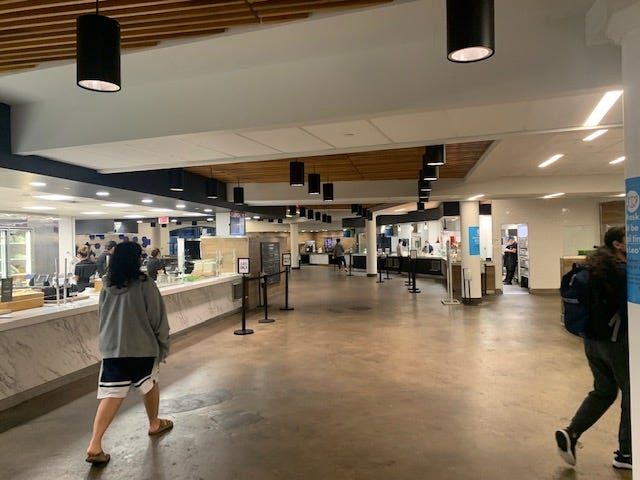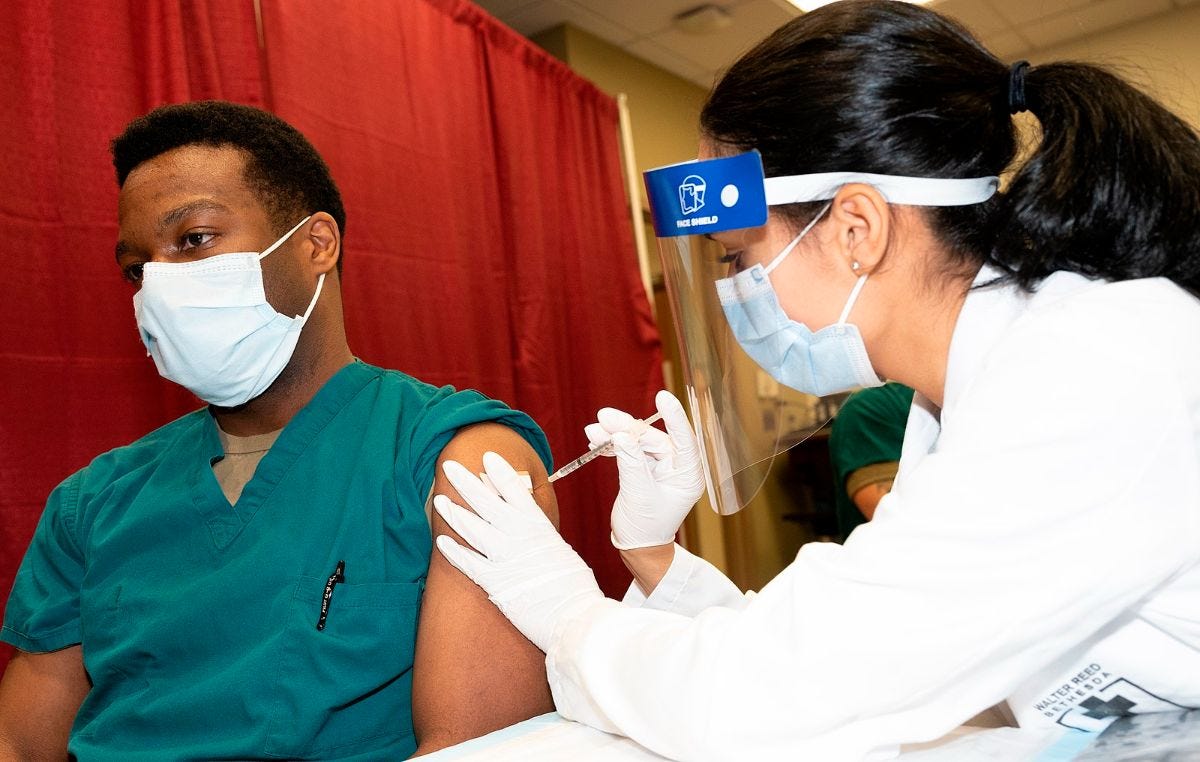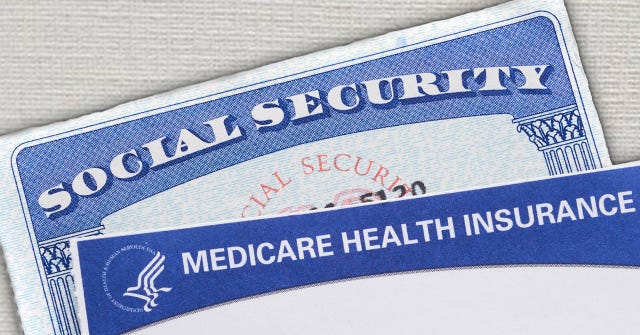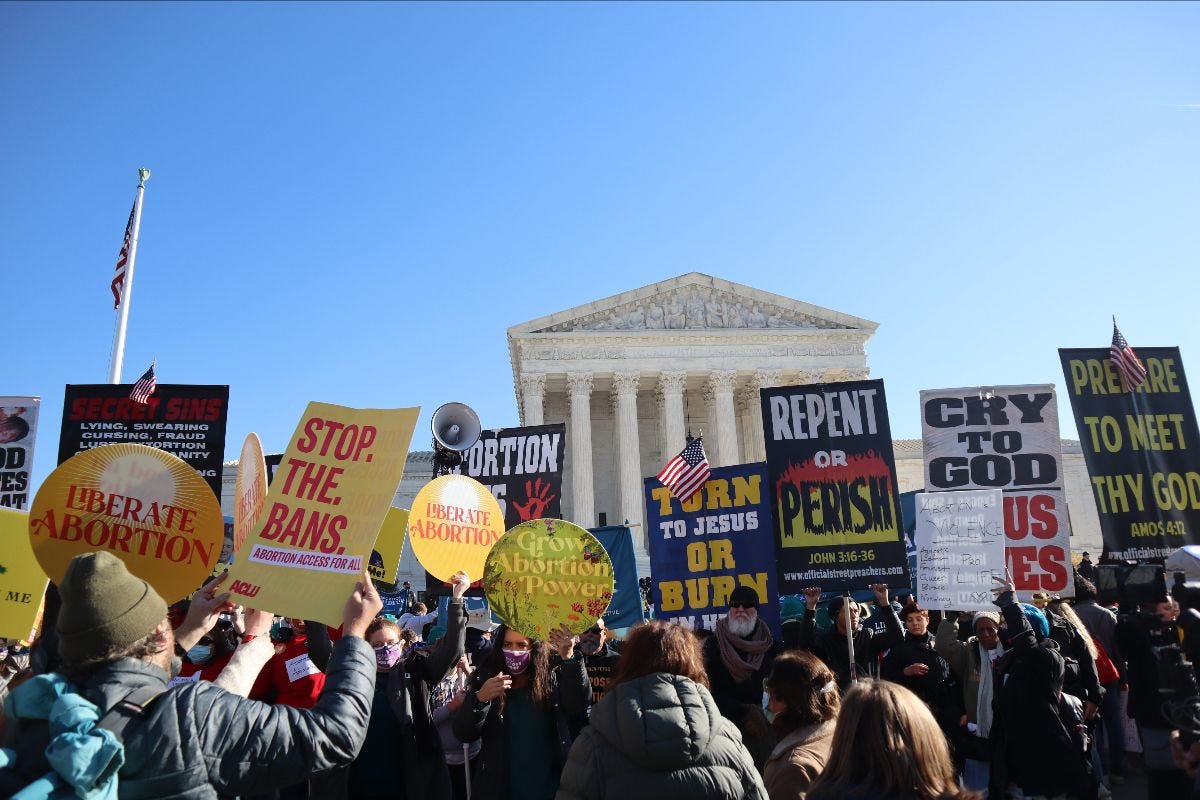Wake Up To Politics - December 16, 2021
Wake Up To Politics: Back in the Covid doldrums
by Gabe Fleisher
Good morning! It’s Thursday, December 16, 2021. Election Day 2022 is 327 days away. Election Day 2024 is 1,055 days away.
I have my last exam of the semester today. Wish me luck. And speaking of school...
Back in the Covid doldrums
Amid a crush of news this week about Mark Meadows’ texts, and Joe Manchin’s dealmaking, and more, I’ll let you in on the story that has really been on my mind over the past couple of days.
It’s this one, via CNN: “Cornell University reported 903 cases of Covid-19 among students between December 7-13, and a ‘very high percentage’ of them are Omicron variant cases in fully vaccinated individuals, according to university officials.”
“As a result, the school has decided to shut down its Ithaca, New York, campus, where it has about 25,600 students,” the CNN report continued. “Cornell’s overall vaccination rate among students is 97%.”
According to a message to the student body from Cornell’s president, the university has moved to “Alert Level Red” and announced that all its final exams would be held online, libraries closed, and university events canceled.
That didn’t sound good. And then I got a pair of emails from my own college, Georgetown University, where I’m currently a sophomore. “IMPORTANT Public Health Alert: Increase in Covid-19 Cases,” read the subject line of the first email, which announced that Wednesday had seen the “largest one-day total for Covid-19 cases within our community” (a whopping 34 of them) and the school’s highest test positivity rate (2.36%) yet.
The second email was titled “Immediate Changes This Semester,” and it informed us that in light of the first email — and the revelation earlier in the week that a member of the community had tested positive for the Omicron variant — some final exams would be moving online, all meetings and events would now be virtual, the gym would be closed, and all on-campus food options would be grab-and-go, with all tables and chairs removed from the dining hall.

And then, tucked at the end, was the part that would soon be lighting up my social media feed, as panicked students rushed to commiserate with one another: “Decisions Regarding Return in Spring Semester.” It read, in full: “We will continue to monitor public health conditions and will be in close communication as we near the start of spring semester activities.”
Not exactly a promise that we’d be back on campus in the fall. An instant reminder of last year, when Georgetown decided not to bring us back on campus either semester and held the entire school year online via Zoom, it was my most personal reminder yet of the renewed state of Covid frenzy we seem to possibly be hurtling into, as cases rise and the Omicron variant looms.
Maybe you have your own, whether its your return-to-office plan once again being scrapped or a friend or relative testing positive (maybe even despite being vaccinated). Or, if you’re a student, perhaps Covid-19 is once again “upending college life” for you, as this CBS News report put it.
Other worrying indicators are out there too. New cases are up 40% in the U.S. over the past two weeks, according to the New York Times; hospitalizations are up 21% and deaths are up 34%.
The Omicron variant appears to be super contagious: one study says it infects around 70 times faster than Delta. And it no longer seems that vaccination (without a booster) is enough to ward off an infection. And Biden administration officials are warning of an imminent “explosion” in cases, one that will “stretch” the nation’s testing supply, plus the Delta-fueled surge is still ongoing and cases of the flu are on the rise as well.
“For all their limitations, the models right now are flashing bright red,” David Wallace-Wells reported in New York Magazine. Meanwhile, Dr. Eric Topol of Scripps Research warned in his newsletter that Omicron’s exponential growth “could take us to levels of even 1 million cases per day in the United States, which previously would have been considered an unthinkable projection.”

Amid this wave of dispiriting news, and the uncertainty about Omicron, I recently mentioned to a friend that this might be the most like March 2020 I’ve felt since March 2020.
But, just to be clear: this is not March 2020.
For one thing, we have vaccines and booster shots — an extraordinarily effective combination, even against Omicron. A new study came out this week that found there would have been approximately 1.1 million additional Covid-19 deaths and 10.3 million additional Covid-19 hospitalizations in the United States this year if not for the vaccines.
There are also a promising suite of Covid antivirals finally on the way, including pills from both Pfizer and Merck. And, at least for now, Omicron appears to be causing milder cases, an encouraging early sign.
Still, though, if you’re feeling a return to the Covid doldrums coming on: you’re not alone. Here’s a New York Times headline from this week to prove it: “Across the World, Covid Anxiety and Depression Take Hold.”
And a Monmouth poll released on Wednesday that found 60% of Americans are now “worn out,” either “a lot” or “a little,” by the changes still being brought on by Covid. I also found this guest essay in the Times interesting, saying we’re now so numb to new Covid developments that we’re experiencing the psychological phenomenon of what’s called a “boring apocalypse.”
“Many people aren’t so afraid of Covid-19 anymore, complicating public health authorities’ efforts to slow Omicron’s spread,” Dr. Adam Grant wrote in the guest essay. “We’ve all seen this horror movie before, and when you’ve watched the killer jump out brandishing a weapon 10 times — even when you’ve watched him kill — it just doesn’t freak you out the same way.”
“The same rerun has been playing for 21 months.”
Just after I read that article, I was scrolling through TikTok, and happened upon a video from a classmate about Georgetown’s ominous email on its spring semester plans. In the background of the video, a popular TikTok sound — a snippet from a Taylor Swift song — was playing: “I think I’ve seen this film before,” it goes. “And I didn’t like the ending.”
What else you should know
→ In Congress. “A push by Senate Democrats to pass a roughly $2 trillion tax-and-spending measure before Christmas appeared in dire political peril Wednesday, as talks soured between President Biden and Sen. Joe Manchin III (D-W.Va.) over the size and scope of the economic package.” Washington Post
The push for voting rights, which some Democrats have pivoted to, doesn’t seem to be going much better: “Sinema pops Democrats' filibuster trial balloon on voting rights” Politico
→ Economy. “The Federal Reserve is further tightening up its pandemic-era easy money policy and will increase the pace of tapering, a move that could usher in rate hikes earlier than expected, according to a statement released at the conclusion of the central bank’s latest policymaking meeting on Wednesday.” NBC News
→ Immigration. “The Biden administration is ending the practice of holding undocumented migrant families in detention centers, turning to remote tracking technology such as ankle bracelets as alternatives.” Axios
→ JFK files. “Frustrated JFK researchers say there is little new to learn in Wednesday’s release of previously classified documents collected as part of the government review into the 1963 assassination of President John F. Kennedy.” CNN

Policy Roundup: Legal
Every Thursday, Wake Up To Politics contributor Anna Salvatore offers an overview of the week’s top legal news.
In a blockbuster order late last week, the Supreme Court left Texas’s abortion law in effect while allowing limited challenges to go forward. Known as S.B. 8, the restrictive new law prevents women from receiving abortions after about five weeks of pregnancy and empowers private citizens to sue if they hear about illicit abortions. In an 18-page opinion on Friday afternoon, Justice Neil Gorsuch did not address whether S.B. 8 was constitutional. He wrote that although abortion providers can pursue their lawsuit against a small number of Texas officials, the Supreme Court will not intervene and block the law. “One thing this Court may never do,” he concluded, “is disregard the traditional limits on the jurisdiction of federal courts just to see a favored result win the day.”
His opinion encountered serious resistance from Chief Justice John Roberts, and Justices Stephen Breyer, Sonia Sotomayor, and Elena Kagan, who argued in dissent that S.B. violates Texans’ constitutional right to an abortion under Roe v. Wade. Calling the law “a brazen challenge to our federal structure,” Sotomayor compared it to southerners’ attempts to nullify federal laws before the Civil War. “This choice to shrink from Texas’ challenge to federal supremacy,” she wrote, “will have far-reaching repercussions.”
The Supreme Court upheld New York’s vaccine requirement for health care workers on Monday, holding that even those who request religious exemptions must get vaccinated against Covid-19. Monday’s order marked the latest in a series of pro-mandate rulings this fall, given that the justices have rejected challenges to vaccine requirements from Indiana University students, New York City teachers, and healthcare workers in Maine.
But that doesn’t mean this week’s order was unanimous. In a 14-page dissent, Justices Neil Gorsuch and Samuel Alito wrote that the First Amendment protects Americans’ right to the free exercise of religion. The people challenging New York’s mandate “are not ‘anti-vaxxers’ who object to all vaccines,” wrote Gorsuch, but Christians who oppose the vaccines’ use of “abortion-derived fetal cells.”
More legal headlines, via Anna:
On Wednesday, the Senate Judiciary Committee questioned Alison Nathan, a 49-year-old district judge whom President Biden has nominated for the Second Circuit.
Arizona asked the Supreme Court to reinstate its law banning abortions where the sole reason is a genetic abnormality (for example, Down’s Syndrome).
Months after his murder conviction, Minneapolis police officer Derek Chauvin pleaded guilty on Wednesday to violating George Floyd’s civil rights.
Jurors heard opening statements this week in the trial of Harvard chemistry professor Charles Lieber, who stands accused of lying about his ties with China.
Ask Gabe
Q: There has been talk of a 6% raise in Social Security distributions, but is it true that the rate for Medicare will also be going up from $148 to $170? — Maddy B.
A: Yes — both of these are true, and the increased Medicare charges will cut into the increased Social Security benefits for some Americans. The Social Security Administration announced in October that retirees will see a 5.9% boost in benefits in 2022, the biggest cost-of-living adjustment (COLA) the agency has made in 39 years.
But, in November, the Centers for Medicare & Medicaid Services (CMS) announced that the standard premium most people have to pay for Medicare Part B (which covers outpatient care and equipment) will increase by 14.5% in 2022, from $148.50 per month to $170.10 per month. The change is in line with years of quickly-growing Part B costs, but this increase is the largest one ever and outpaced what had been previously projected for 2022.
Why? The CMS gave three reasons: “rising prices and utilization across the health care system that drive higher premiums year-over-year alongside anticipated increases in the intensity of care provided” (aka Covid), the expiration of a pandemic-era cap on increases to Part B premiums that only applied to 2021, and the new Alzheimer’s drug, Aduhelm.

The FDA caused an uproar in June when it approved Aduhelm, the first new Alzheimer’s treatment in 18 years, despite opposition from its independent advisory committee and mixed evidence of its effectiveness. At the time, experts warned that approval of the expensive drug would cause an uptick in Medicare costs since Part B premiums are required to be 25% of the estimated costs that will be incurred by the program that year (and the same premium applies to everyone, even if they aren’t an Alzheimer’s patient and don’t take Aduhelm.)
Those experts were right: per CNBC, about half of the premium increase can be attributed to the potential cost of covering Aduhelm. (For context on how costly the drug is: total Medicare spending for all Part B drugs was $37 billion in 2019. According to the Kaiser Family Foundation, spending on Aduhelm alone would be $29 billion in one year if 500,000 people were prescribed the drug.)
How are the COLA adjustment for Social Security and the increased Medicare premiums connected? Part B premiums are typically deducted from monthly Social Security checks. “The Part B increase will consume the entire annual cost of living adjustment of Social Security recipients with the very lowest benefits, of about $365 per month,” according to a Forbes report, wiping out the historic COLA change for those recipients.
Daybook
All times Eastern.
→ President Joe Biden will receive his daily intelligence briefing at 9:30 a.m. Then, at 1:30 p.m., he will award the Medal of Honor — the U.S. government’s highest and most prestigious military decoration — to the late Army Sgt. First Class Alwyn Cashe, the late Army Master Sgt. Earl Plumlee, and Army Sgt. First Class Christopher Celiz.
According to the Washington Post, Cashe “suffered mortal injuries in Iraq while rescuing fellow soldiers from a burning vehicle in 2005,” Plumlee is “a Special Forces soldier who fought off Taliban suicide bombers in Afghanistan in 2013,” and Celiz was “an Army Ranger who died after stepping between Taliban fighters targeting a U.S. helicopter evacuating his fellow soldiers in 2018.”
Cashe’s posthumous recognition comes after more than a decade of advocates pushing for him to receive the award; he will be the first Black service member to receive the Medal of Honor for actions in the wars in Iraq or Afghanistan.
Following the ceremony, which First Lady Jill Biden will also attend, the president will meet at 3 p.m. with members of the White House Covid-19 Response Team to discuss the Omicron variant.
→ Vice President Kamala Harris will deliver remarks on the bipartisan infrastructure law at 9:55 a.m. at the AFL-CIO headquarters. EPA Administrator Michael Regan will also deliver remarks. At 1:30 p.m., Harris and Second Gentleman Doug Emhoff will attend the Medal of Honor ceremony.
At 3 p.m., Harris will join Biden for his Omicron briefing. Finally, at 4:20 p.m., Harris will ceremonially swear in Brian Nelson as Under Secretary of the Treasury for Terrorism and Financial Crimes.
→ White House Principal Deputy Press Secretary Karine Jean-Pierre will hold the daily press briefing at 3:15 p.m. White House Deputy National Climate Advisor Ali Zaidi will also join.
→ The Senate will convene at 10 a.m. and resume debate over the nomination of Atul Gawande to be Assistant Administrator of the U.S. Agency for International Development (USAID). The chamber will then recess from 1 p.m. to 2 p.m. for weekly caucus meetings.
Roll call votes are expected to be held after the Senate returns, including a discharge vote on the nomination of Holly Thomas to be a U.S. Circuit Judge for the Ninth Circuit. The Senate Judiciary Committee cast a tie vote on reporting her nomination to the floor, meaning the full Senate must hold today’s vote to discharge her nomination from the committee before it can consider the nomination.
→ The House will convene at 11 a.m. for a brief pro forma session. No votes or debate will be held.
→ The Supreme Court will not meet today.




